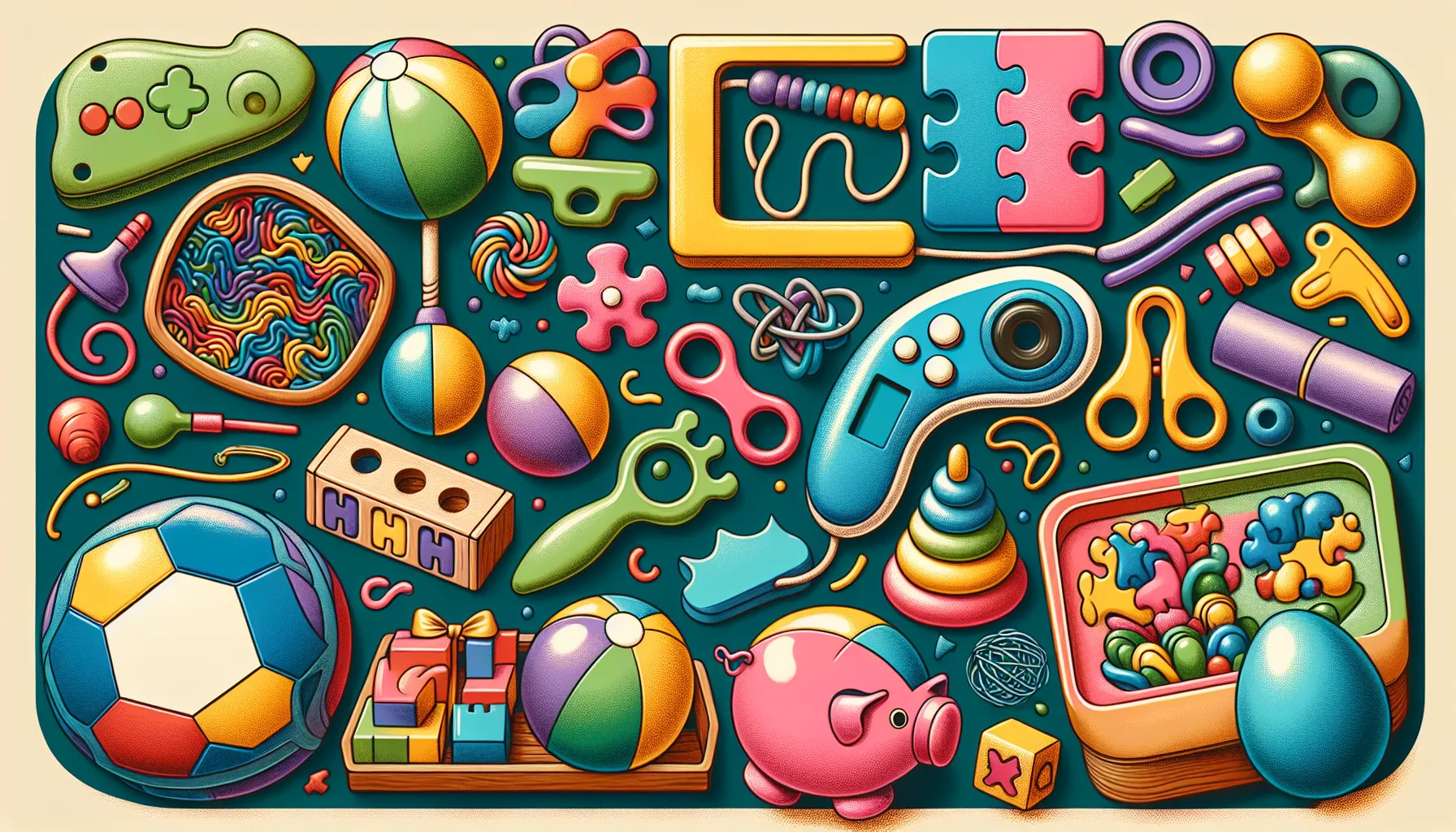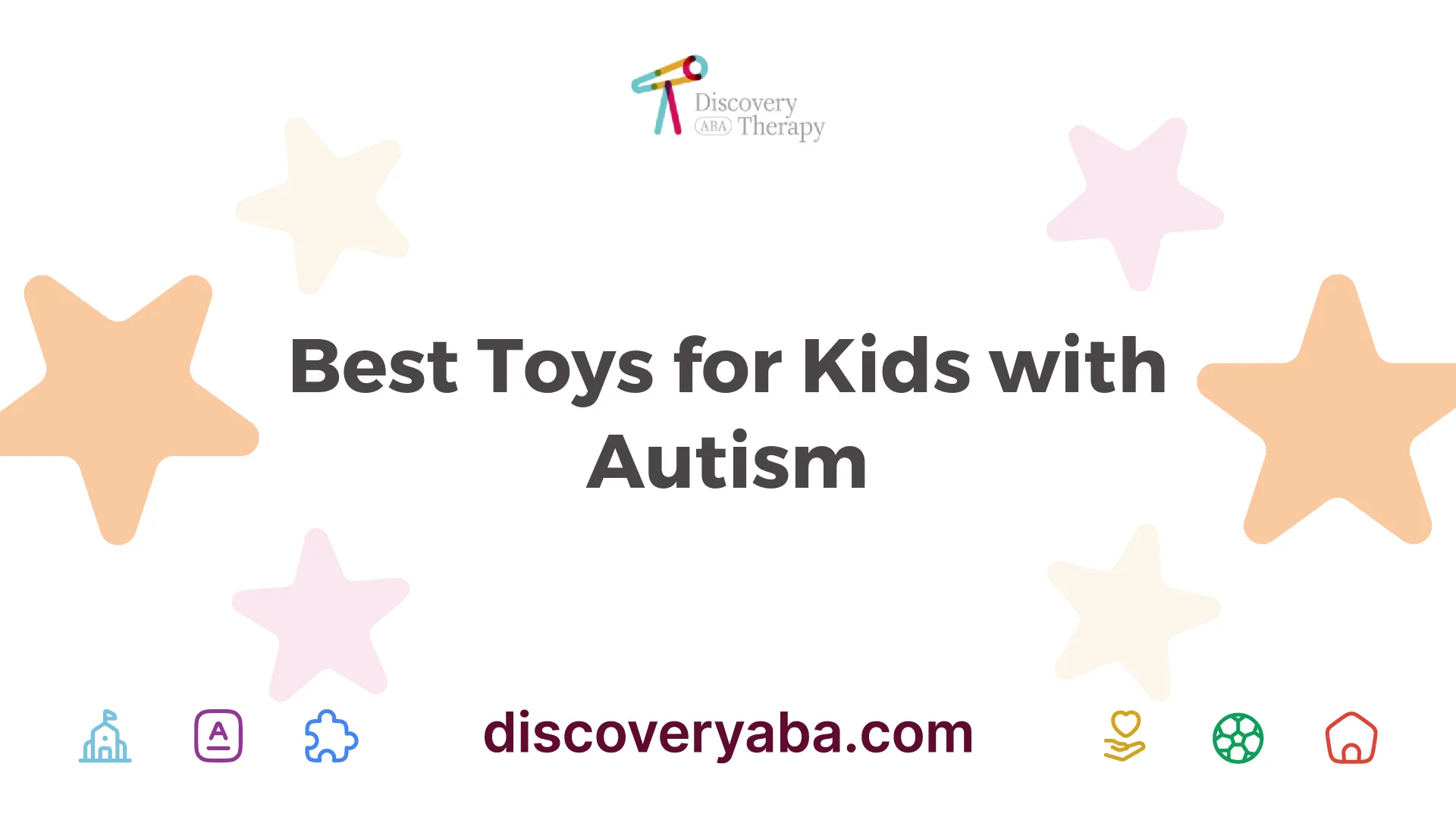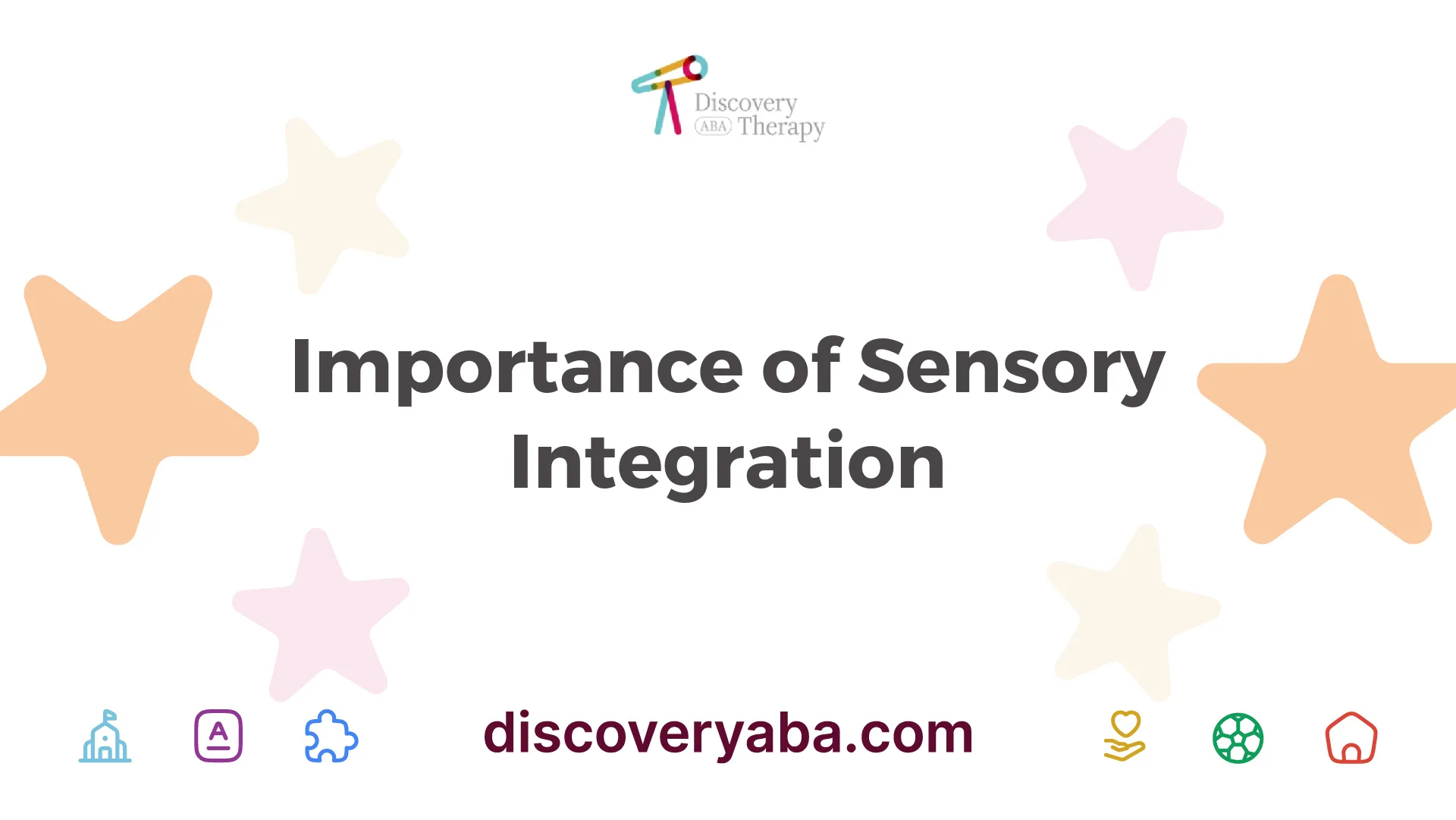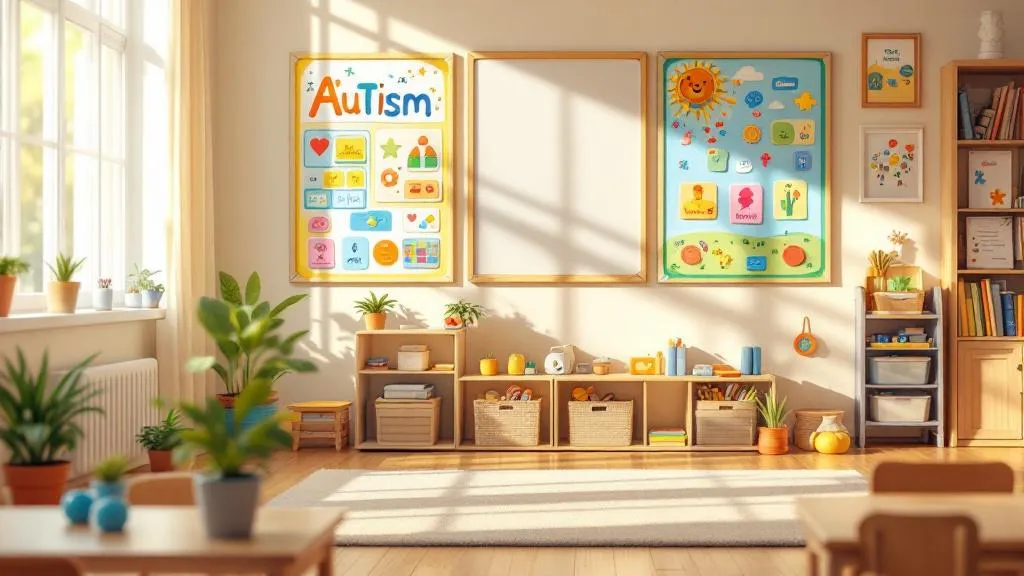Best Toys for Kids with Autism
Discover the best toys for kids with autism to enhance sensory skills and promote fun learning experiences!

Essential Sensory Toys
Understanding Sensory Toys
Sensory toys are specially designed to stimulate one or more of the senses, assisting children on the autism spectrum in engaging with their environment. These toys help children remain calm and provide the sensory experiences they seek, making them an important tool in developmental play. According to Autism Speaks, sensory toys not only support individual play but should also enable interactions with family, friends, and peers, promoting social connections and engagement.
Sensory Toy TypeDescriptionFidget ToysDesigned for tactile stimulation and to promote focus.Chew ToysProvide oral sensory stimulation to help alleviate anxiety.RainmakersCreate a calming sound experience through motion.

Benefits for Children with Autism
Sensory toys play a crucial role in supporting children with autism. They contribute significantly to sensory integration, helping to focus attention while providing relief from stress and anxiety. Engaging with these toys can promote relaxation and calmness, which can be particularly beneficial during overwhelming situations.
Here are some notable benefits of sensory toys for children with autism:
By incorporating sensory toys into playtime, parents can nurture their child's sensory needs and support overall development. For additional resources and support, families can connect with services like the Autism Response Team (ART) for information and resources tailored to their specific needs.
Types of Sensory Toys
Sensory toys play a crucial role in the development and well-being of children diagnosed with autism. These toys are designed to stimulate a child's five senses: sight, sound, touch, smell, and taste. By providing controlled sensory input, these toys help children regulate their sensory experiences and improve sensory processing. Below are three common types of sensory toys: fidget toys, chew toys, and rainmakers.
Fidget Toys
Fidget toys are designed to keep hands busy and provide sensory stimulation. They can help children focus, relax, and manage anxiety. These toys often come in various forms, including spinners, cubes, and elastic bands. Fidget toys are especially beneficial for children who may find it challenging to sit still or concentrate.
Fidget Toy TypeDescriptionBenefitsSpinning ToysSmall toys that spin when activated.Promote focus and stress relief.Fidget CubesMulti-faceted toys that allow for various movements.Help reduce anxiety and improve concentration.Stress BallsSoft, squeezeable toys that provide tactile feedback.Assist in stress relief and fine motor skill practice.
Chew Toys
Chew toys can be powerful tools for children with sensory processing needs. These toys offer a safe way to meet oral sensory requirements and are beneficial for both younger children and older individuals. Children who experience strong cravings for oral sensory input can find comfort through these toys, aiding in self-soothing and providing a calming effect.
Chew Toy TypeDescriptionBenefitsSilicone ChewablesSoft and durable toys made from food-grade silicone.Safe for chewing and helps develop oral motor skills.Chewable NecklacesFun accessories that children can safely chew on.Discreet and accessible for sensory needs in social settings.Textured Chew ToysToys with varying textures to enhance sensory input.Help to engage multiple senses while satisfying oral needs.
Chew toys provide not only sensory stimulation but also assist in developing fine motor skills and improving hand-eye coordination through chewing and grasping actions.
Rainmakers
Rainmakers are captivating sensory toys that create soothing sounds reminiscent of falling rain. These toys often consist of a clear tube filled with small beads or pellets that produce gentle sounds as they cascade from one end to the other. Rainmakers are excellent for calming anxious children and providing a relaxing sensory experience.
Rainmaker FeatureDescriptionBenefitsVisual AppealBrightly colored beads or pellets inside a clear tube.Engages visual senses while providing auditory feedback.Calming SoundsProduces soft, rain-like sounds when tilted.Helps reduce anxiety and promote relaxation.PortableLightweight and easy to carry.Can be used at home or during outings for sensory breaks.
Rainmakers not only address sensory needs but also promote focus and engagement, making them suitable toys for therapeutic settings. They're excellent for social skill development, as children can enjoy these toys together.
By understanding the various types of sensory toys available, parents can select the best toys for kids with autism that suit their child's unique sensory needs. For additional tips on how to choose the right toys, check out our section on choosing the right toys.

Importance of Sensory Integration
Sensory integration plays a critical role in the development and daily functioning of children diagnosed with autism. It refers to the process where the brain organizes and interprets information received from the senses. Many children with autism experience sensory processing issues, making it essential to understand these challenges.
Sensory Processing Issues
Children on the autism spectrum often face sensory processing issues, which can lead to difficulties in responding appropriately to sensory stimuli. This can include sensitivities to lights, sounds, textures, or even tastes. Sensory toys designed for autism aim to stimulate one or more senses, helping children meet their sensory needs safely and positively.
The recognition of sensory sensitivities has been acknowledged by the American Psychiatric Association, emphasizing their importance in the diagnostic criteria for autism. By addressing these sensitivities, sensory toys provide the experiences that autistic children desire, giving them a sense of comfort and control in their environment [1].
Development and Exploration
Sensory integration also supports overall development and exploration. Sensory toys play a crucial role in creating a safe and natural environment for sensory exploration and play. These toys promote relaxation, focus, and calmness [1]. They help children with autism learn through play, improving their social skills, fine motor skills, and overall cognitive development.
Type of Sensory ToyBenefitsFidget ToysHelp improve focus and relieve anxietyChew ToysProvide sensory stimulation and comfortRainmakersEncourage visual and auditory exploration
Engaging with sensory toys not only aids in reducing anxiety but also fosters engagement in play and interaction with peers. Through the use of sensory toys, children can explore and develop skills in a manner that is both enjoyable and beneficial for their overall growth. Parents looking for suitable resources may find our article on best toys for kids with autism helpful for discovering appropriate options.
Therapeutic Benefits of Toys
Toys play a significant role in the development and therapy of children diagnosed with autism. They not only provide entertainment but also foster essential skills that can aid in their growth.
Social Skill Development
Engaging with toys can greatly enhance social skills in children with autism. Therapeutic toys encourage interaction, communication, and teamwork. These experiences help children understand social cues, practice taking turns, and develop empathy. Various interactive toys can provide opportunities for practicing essential social skills in enjoyable contexts.
Here are some of the benefits of toys in social skill development:
BenefitDescriptionEncourages CommunicationInteractive play can stimulate conversations and engagement.Teaches Turn-TakingMany games and activities require sharing and taking turns.Promotes TeamworkGroup play encourages collaboration and a sense of community.Increases ConfidenceAchieving toy-related tasks boosts self-esteem and social comfort.
These experiences can significantly impact children’s ability to connect with peers and adults alike, facilitating meaningful relationships. For further insights into improving social skills, check out our piece on role-playing activities for autism social skills training.
Fine Motor Skill Support
Toys that enhance fine motor skills are equally important. These toys help improve hand-eye coordination and dexterity through engaging and stimulating play. Activities such as stacking, squeezing, or threading enhance control over small movements, which can be vital for everyday tasks.
The following are key benefits of toys in developing fine motor skills:
BenefitDescriptionImproves Hand-Eye CoordinationActivities involving various motions aid in gradient improvement.Enhances Grip StrengthToys requiring squeezing or lifting can strengthen hand muscles.Promotes PrecisionTasks like threading beads develop concentration and careful movements.
By incorporating a range of interactive toys that focus on these skills, parents can provide opportunities for their children to practice and refine their motor abilities. This not only supports therapy goals but also helps in overall development. For additional suggestions on supporting siblings of children with autism, check our article on how to support siblings of children with autism?.
Through thoughtful selection of toys that promote social interaction and fine motor skill development, parents can contribute significantly to their child's therapeutic journey.
Choosing the Right Toys
Selecting the most suitable toys for children with autism is essential to support their sensory needs and developmental goals. This section covers recommendations from therapists and how to tailor choices to individual needs.
Therapist Recommendations
When it comes to finding the best toys for kids with autism, therapists often suggest focusing on the specific sensory preferences and developmental objectives of the child. Here are some commonly recommended toy categories:
Toy TypeBenefitsChew ToysHelps manage anxiety, improves focus, and supports oral motor skills. Mental Health Center KidsFidget ToysEnhances concentration and provides sensory stimulation, making it easier to manage stress.RainmakersOffers calming auditory stimulation and visual tracking, which can be soothing for some children.
Employing toys that therapists suggest can engage children in meaningful play while also supporting their developmental needs.
Tailoring to Individual Needs
Every child on the autism spectrum is unique, which means toy selection should cater to their specific preferences and sensory needs. Here are several factors to consider:
By considering these aspects, parents can effectively choose toys that not only entertain but also promote growth and development in children with autism. For more in-depth insights into supporting play for children with autism, explore our articles on autism and sensory processing disorder or how to create an autism-friendly home.
Play Therapy for Autism
Play therapy can significantly benefit children diagnosed with autism by fostering mental and emotional growth. This therapeutic approach allows children to express themselves and work through challenges in a safe and engaging environment.
Enhancing Neuroplasticity
One of the remarkable aspects of play therapy is its ability to induce neuroplasticity. Through various play mechanisms, including empathic harmony and emotional provocation, children can integrate their emotions and cognition. This co-construction of nonverbal experiences leads to the formation of new neural circuits in the brain.
The outcome of such neuroplastic changes can be profound. It helps children adapt more effectively to their environments, learn new skills, and develop coping mechanisms for various situations. The following table illustrates the neuroplasticity factors influenced by play therapy.
Neuroplasticity FactorsDescriptionEmpathic HarmonyEmotional mirroring that fosters understanding.Emotional ProvocationStimulating emotions to facilitate processing.Affect and Cognition IntegrationMerging feelings with thoughts for better comprehension.Nonverbal Narrative ConstructionCreating stories to express emotions without words.
Emotional Well-Being
Play therapy also plays a crucial role in enhancing emotional well-being. Engaging in play activates the brain's mirror neurons, allowing children to accurately interpret and acknowledge their own emotional states. This process raises levels of oxytocin, a hormone that enhances feelings of trust and connection.
As children engage in play, they experience joy and creativity, which contributes to their emotional development. The therapeutic relationship formed between the play therapist and the child encourages the child to feel safe, making them more receptive to behavioral changes.
For parents searching for the best toys for kids with autism, incorporating play therapy tools can further support this emotional and social growth. Families are also encouraged to consider autism friendly vacations that allow for playful and stress-free experiences which can greatly enhance overall emotional well-being.
References
[2]:
[3]:
[4]:
[5]:
[6]:
Does Your Child Have An Autism Diagnosis?
Learn More About How ABA Therapy Can Help
Find More Articles
Contact us
North Carolina, Nevada, Utah, Virginia
New Hampshire, Maine
Arizona, Colorado, Georgia, New Mexico, Oklahoma, Texas
.avif)




































































































